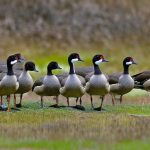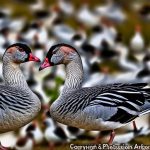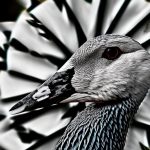Golf courses are often seen as serene and picturesque landscapes, offering a peaceful escape from the hustle and bustle of everyday life. However, the presence of geese on these meticulously maintained grounds can quickly turn this idyllic setting into a source of frustration for both golfers and course managers. Geese are attracted to golf courses for a variety of reasons, including the abundance of open grassy areas, water features, and the lack of natural predators. While these birds may seem harmless at first glance, their presence can have a significant impact on the overall aesthetics and functionality of the course. From damaging the turf with their droppings to posing a safety hazard for golfers, geese can quickly become a nuisance that requires proactive management strategies to address.
Key Takeaways
- Geese on golf courses can cause damage to the turf, create safety hazards, and leave behind unsightly droppings.
- Geese can impact the aesthetics and playability of the golf course, as well as the overall experience for golfers.
- Methods for keeping geese off golf courses include habitat modification, sound and visual deterrents, and trained dogs.
- Natural deterrents for geese include planting tall grasses, using predator decoys, and applying non-toxic repellents.
- Physical barriers such as fences, netting, and floating barriers can be effective in keeping geese away from golf courses.
- Regular maintenance and monitoring are crucial for the long-term success of keeping geese off golf courses.
- By implementing a combination of methods and staying vigilant with maintenance, golf courses can effectively manage and deter geese, creating a better experience for golfers.
The impact of geese on golf courses
The presence of geese on golf courses can have a multitude of negative impacts that affect both the aesthetics and functionality of the course. One of the most noticeable effects of geese is the damage they can cause to the turf with their droppings. Not only do these droppings create unsightly blemishes on the otherwise pristine greens and fairways, but they can also contribute to the spread of disease and create an unpleasant odor. Additionally, the accumulation of droppings can make it difficult for golfers to enjoy their game, as they may have to navigate around these hazards or risk stepping in them. Furthermore, geese can also pose a safety hazard for golfers, as their aggressive behavior during nesting season or when protecting their young can lead to confrontations and potential injuries. This can create a negative experience for golfers and may even deter them from returning to the course in the future.
Methods for keeping geese off golf courses
There are several methods that golf course managers can employ to keep geese off their grounds and mitigate the negative impacts associated with their presence. One effective approach is the use of natural deterrents, such as planting tall grasses or shrubs around water features to create an inhospitable environment for geese. These natural barriers can discourage geese from congregating in these areas and help minimize their impact on the course. Another method is the use of sound deterrents, such as propane cannons or recorded distress calls, to create an auditory deterrent that can discourage geese from settling on the course. Additionally, employing trained dogs to patrol the grounds can also be an effective way to keep geese at bay, as their presence can instill a sense of fear in the birds and encourage them to seek out alternative habitats.
Natural deterrents for geese
Natural deterrents offer a non-invasive and environmentally friendly approach to keeping geese off golf courses. One effective natural deterrent is the use of tall grasses and shrubs around water features, which can create an inhospitable environment for geese to roost and feed. By planting these natural barriers strategically, golf course managers can discourage geese from congregating in these areas and minimize their impact on the course. Additionally, introducing native plant species that are unpalatable to geese can help deter them from foraging on the course, as they will seek out more suitable food sources elsewhere. Furthermore, creating natural habitats for geese away from the golf course, such as wetland restoration projects or designated wildlife areas, can provide alternative spaces for these birds to thrive without encroaching on the course.
Physical barriers for keeping geese away
In addition to natural deterrents, physical barriers can also be employed to keep geese away from golf courses. One common physical barrier is the use of fencing or netting around water features and other areas where geese tend to congregate. This can prevent geese from accessing these areas and minimize their impact on the course. Another physical barrier is the use of floating barriers on water features, such as buoys or floating islands, which can create an obstacle that discourages geese from landing and roosting in these areas. Additionally, installing motion-activated sprinkler systems can startle geese and deter them from settling on the course, as they will seek out quieter and less disruptive environments.
The importance of regular maintenance and monitoring

Regular maintenance and monitoring are essential components of any successful strategy for keeping geese off golf courses. This includes regularly inspecting the grounds for signs of goose activity, such as droppings or feathers, and taking proactive measures to address any issues that arise. Additionally, maintaining natural deterrents, such as tall grasses and shrubs, requires regular upkeep to ensure that they remain effective at discouraging geese from settling on the course. Furthermore, monitoring the effectiveness of sound deterrents and physical barriers is crucial for identifying any areas that may require adjustments or additional measures to keep geese at bay. By staying vigilant and proactive in their approach to managing geese, golf course managers can minimize the negative impacts associated with their presence and maintain a welcoming environment for both golfers and wildlife.
Conclusion and final thoughts on keeping geese off golf courses
In conclusion, the presence of geese on golf courses can have a significant impact on both the aesthetics and functionality of the grounds. From damaging the turf with their droppings to posing a safety hazard for golfers, geese can quickly become a nuisance that requires proactive management strategies to address. By employing a combination of natural deterrents, physical barriers, and regular maintenance and monitoring, golf course managers can effectively keep geese off their grounds and minimize their impact on the overall experience for golfers. It is important to approach this issue with a holistic perspective that takes into account the needs of both wildlife and golfers, in order to create a balanced and sustainable environment that can be enjoyed by all. With careful planning and proactive management, it is possible to create a harmonious coexistence between geese and golf courses that preserves the beauty and integrity of these cherished landscapes.
Looking for effective ways to keep geese off your golf course? Check out this insightful article on PoultryWizard that discusses the incubation period for goose eggs. Understanding the breeding and nesting habits of geese can provide valuable insights into how to deter them from disrupting your golf game.
FAQs
What are some effective methods to keep geese off a golf course?
Some effective methods to keep geese off a golf course include using border collies to chase the geese away, installing fencing or barriers to prevent them from entering the course, using noise deterrents such as propane cannons or distress calls, and applying non-toxic repellents to the grass.
Why is it important to keep geese off a golf course?
It is important to keep geese off a golf course because their droppings can create unsightly and unsanitary conditions, damage the turf, and pose a health risk to golfers. Additionally, geese can be aggressive and territorial, potentially posing a safety hazard to golfers.
Are there any environmentally friendly methods to keep geese off a golf course?
Yes, there are environmentally friendly methods to keep geese off a golf course. These include using natural predators such as border collies, installing habitat modification techniques such as planting tall grasses or shrubs to discourage geese from landing, and using non-toxic repellents that are safe for the environment.
What are some long-term solutions for keeping geese off a golf course?
Some long-term solutions for keeping geese off a golf course include implementing habitat modification techniques to make the area less attractive to geese, using ongoing maintenance of deterrents such as noise devices or visual deterrents, and establishing a comprehensive management plan that includes regular monitoring and adjustments as needed.
Meet Walter, the feathered-friend fanatic of Florida! Nestled in the sunshine state, Walter struts through life with his feathered companions, clucking his way to happiness. With a coop that’s fancier than a five-star hotel, he’s the Don Juan of the chicken world. When he’s not teaching his hens to do the cha-cha, you’ll find him in a heated debate with his prized rooster, Sir Clucks-a-Lot. Walter’s poultry passion is no yolk; he’s the sunny-side-up guy you never knew you needed in your flock of friends!







